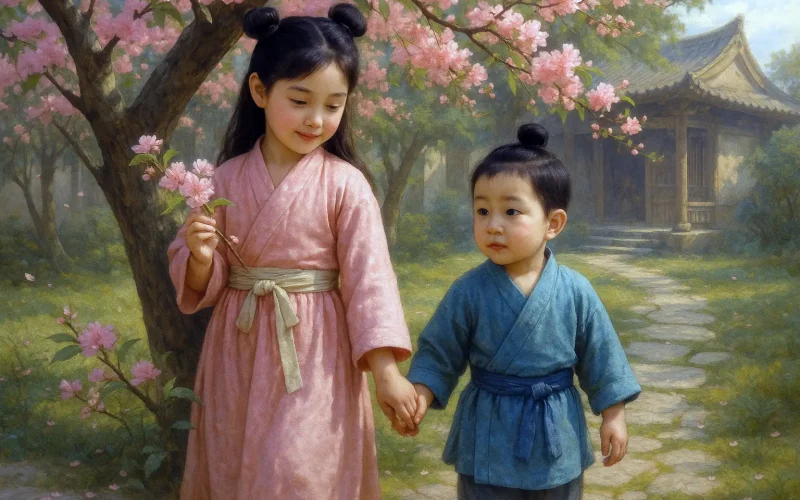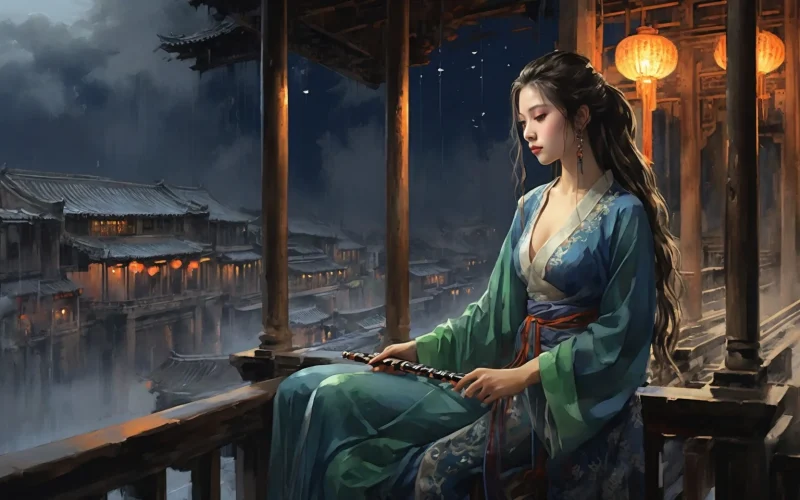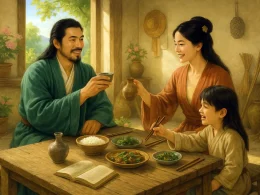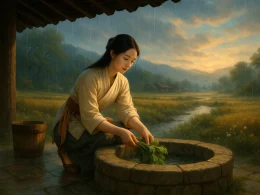Mulberry leaves in Southern land are green;
The silkworms thrice in sleep must have been.
In Eastern Lu my family stays still.
Who'd help to sow our fields north of Lu Hill?
It's now too late to do farm work of spring.
What then am I to do while traveling?
The southern wind is blowing without stop;
My heart flies back to my old familiar wine-shop.
East of the shop there's a peach tree oft missed;
Its branches must be waving in bluish mist.
It is the tree I planted three years ago;
If it has grown to reach the eaves, I don't know.
I have not been at home for three long years;
I can imagine my daughter appears
Beside the tree and plucks a flower pink,
Without seeing me, she must have, I think,
Shed copious tears.
My younger son has grown
Up to his sister's shoulders.
Beneath full-blown
Peach tree they stand side by side.
But who's there
To pat them on the back?
I feel, whene'er
I think of this, so painful that I write
And send to them this poem on silk white.
Original Poem
「寄东鲁二稚子」
李白
吴地桑叶绿,吴蚕已三眠。
我家寄东鲁,谁种龟阴田?
春事已不及,江行复茫然。
南风吹归心,飞堕酒楼前。
楼东一株桃,枝叶拂青烟。
此树我所种,别来向三年。
桃今与楼齐,我行尚未旋。
娇女字平阳,折花倚桃边。
折花不见我,泪下如流泉。
小儿名伯禽,与姊亦齐肩。
双行桃树下,抚背复谁怜?
念此失次第,肝肠日忧煎。
裂素写远意,因之汶阳川。
Interpretation
This poem was composed in 744 AD, when Li Bai, having been sidelined by powerful officials in the court, left Chang'an and resided in Jinling. It is a reflective work expressing the poet's deep longing for his hometown, his fields, and his children.
First Couplet: “吴地桑叶绿,吴蚕已三眠。”
Wú dì sāng yè lǜ, wú cán yǐ sān mián.
The mulberry leaves in Wu are lush and green; the silkworms have already molted three times.
The poet vividly depicts the early spring scenery of Jiangnan, capturing the busy and vibrant atmosphere of the farming season.
Second Couplet: “我家寄东鲁,谁种龟阴田?”
Wǒ jiā jì dōng lǔ, shuí zhòng guī yīn tián?
My home is far away in Donglu; who now tends the fields at the foot of Mount Gui?
The poet expresses his concern for his homeland, revealing his anxiety about being far from home and the fields left unattended.
Third Couplet: “春事已不及,江行复茫然。”
Chūn shì yǐ bù jí, jiāng xíng fù máng rán.
The time for spring planting has passed, and my journey along the river remains aimless.
The poet laments missing the farming season, expressing his uncertainty about the future and his sense of drifting.
Fourth Couplet: “南风吹归心,飞堕酒楼前。”
Nán fēng chuī guī xīn, fēi duò jiǔ lóu qián.
The south wind carries my longing for home, as if dropping me before the tavern of my hometown.
With a fantastical imagination, the poet portrays his eagerness to return home, opening a warm and nostalgic scene.
Fifth Couplet: “楼东一株桃,枝叶拂青烟。”
Lóu dōng yī zhū táo, zhī yè fú qīng yān.
To the east of the tavern stands a peach tree, its branches and leaves brushing against the faint mist.
The poet uses delicate brushstrokes to describe the familiar scenery of his hometown, with the peach tree becoming a symbol of his longing.
Sixth Couplet: “此树我所种,别来向三年。”
Cǐ shù wǒ suǒ zhòng, bié lái xiàng sān nián.
I planted this tree myself, and it has been three years since I left home.
The growth of the peach tree hints at the passage of time, evoking deep nostalgia for his hometown and children.
Seventh Couplet: “桃今与楼齐,我行尚未旋。”
Táo jīn yǔ lóu qí, wǒ xíng shàng wèi xuán.
Now the peach tree is as tall as the tavern, yet I have not returned home.
The tree's height symbolizes the prosperity of his home, but the poet's own wandering adds a layer of melancholy.
Eighth Couplet: “娇女字平阳,折花倚桃边。”
Jiāo nǚ zì píng yáng, zhé huā yǐ táo biān.
My beloved daughter, Pingyang, is picking flowers by the peach tree.
The scene of his young daughter playing by the tree is filled with tender familial affection.
Ninth Couplet: “折花不见我,泪下如流泉。”
Zhé huā bù jiàn wǒ, lèi xià rú liú quán.
As she picks flowers, she thinks of me and weeps like a flowing spring.
Through delicate emotional description, the poet portrays his daughter's longing for him, a deeply moving image.
Tenth Couplet: “小儿名伯禽,与姊亦齐肩。”
Xiǎo ér míng bó qín, yǔ zǐ yì qí jiān.
My young son, Boqin, is now as tall as his sister.
The rapid growth of his son highlights the poet's regret at not being there to witness it.
Eleventh Couplet: “双行桃树下,抚背复谁怜?”
Shuāng xíng táo shù xià, fǔ bèi fù shuí lián?
The two walk together under the peach tree; who now comforts and cares for them?
The poet imagines his children walking together under the tree, emphasizing their loneliness without parental care.
Twelfth Couplet: “念此失次第,肝肠日忧煎。”
Niàn cǐ shī cì dì, gān cháng rì yōu jiān.
Thinking of this, my thoughts are in disarray, and my heart is tormented daily.
The poet's longing for home and concern for his children intertwine, revealing his deep parental love.
Thirteenth Couplet: “裂素写远意,因之汶阳川。”
Liè sù xiě yuǎn yì, yīn zhī wèn yáng chuān.
I tear a piece of silk to write my distant thoughts, sending them to the Wenyang River.
The poet takes concrete action to express his emotions, embodying his profound and sincere longing for home and family.
Overall Appreciation
This poem is one of Li Bai's most distinctive works on homesickness, blending vivid artistic imagination with genuine emotion. Through the depiction of spring in Wu, the poet expresses his longing for his hometown, fields, and children. The growth of the peach tree contrasts with his own wandering, while the growth of his children highlights his regret at not being there to raise them. The poem combines nostalgia for his homeland with concern for his family, creating a deeply moving work. The poet's use of imagery, such as the south wind carrying his longing and the peach tree growing tall while he remains away, enhances the poem's emotional impact, balancing melancholy with warmth and poetic beauty.
Writing Characteristics
- Scene and Emotion Intertwined: The poet skillfully blends the spring scenery of Jiangnan with his longing for home.
- Fantastical Imagination: Lines like "the south wind carries my longing" create a blend of reality and imagination, full of emotional power.
- Delicate Description: The portrayal of his children's appearance, actions, and emotions is vivid and touching.
- Cohesive Structure: The poem progresses from scenery to emotion and finally to the expression of longing, forming a seamless whole.
Insights
This poem reveals Li Bai's deep affection for his hometown and children while reflecting the helplessness of ancient scholars who often had to leave home due to career setbacks. The poet channels his sorrow and longing into natural imagery, using the peach tree as a symbol of time, making his homesickness even more poignant. From this poem, we can appreciate the value of family and the impermanence of life, as well as the melancholy of wandering. In modern society, despite the convenience of travel, separation remains a constant in life. This poem reminds us to cherish the time we have with our families and not let the years slip away, leaving only regret.
Poem translator
Xu Yuan-chong(许渊冲)
About the poet

Li Bai (李白), 701 - 762 A.D., whose ancestral home was in Gansu, was preceded by Li Guang, a general of the Han Dynasty. Tang poetry is one of the brightest constellations in the history of Chinese literature, and one of the brightest stars is Li Bai.












